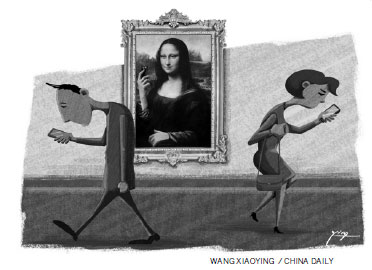What we look for when we stare at smartphones?
Updated: 2016-01-09 09:25
By Zhang Yuchen(China Daily)
|
||||||||

Her eyes glued to the screen of her smartphone, a 28-year-old accidentally fell into a river in Wenzhou, Southeast China's Zhejiang province, and drowned on Dec 29. No one was around at that time.
A video posted later on the Internet revealed these facts, shocking people across the country and eliciting a wave of sympathy for the family of the woman, surnamed Wang, especially her two children. The video also highlighted the dangers of smartphone addiction.
For years, authorities have been warning people not to use their mobile phones while driving or crossing the road. Some local transportation authorities have also issued regulations explicitly forbidding the use of phones while driving. In December, traffic police officers in East China's Shandong province, speaking on the basis of their experience, said texting or talking on the phone is much more harmful than alcohol or drug addiction for drivers.
Regulations and official warnings are aimed at people's safety and well-being, because research shows using smartphones while driving or crossing the road is hazardous; the brain needs time (may be a second or less than a second) to switch from the virtual to the real world and within that time a serious accident can occur. Besides, excess use of smartphones even in normal circumstances and environs can lead to neck pain and poor eyesight.
But if smartphones are such a hazard, why do we use them?
The "US Smartphone Use in 2015", a report by Pew Research Center, says different people use smartphones for different reasons. Apart from facilitating activities such as making calls, texting, seeking information and banking, smartphones also provide "productive" and "happy" emotions. Despite that, the report says, many people don't think smartphones are "essential".
- Global health entering new era: WHO chief
- Brazil's planning minister steps aside after recordings revelation
- Vietnam, US adopt joint statement on advancing comprehensive partnership
- European border closures 'inhumane': UN refugee agency
- Japan's foreign minister calls A-bombings extremely regrettable
- Fukushima impact unprecedented for oceans: US expert

 Stars of Lijiang River: Elderly brothers with white beards
Stars of Lijiang River: Elderly brothers with white beards
 Wealthy Chinese children paying money to learn British manners
Wealthy Chinese children paying money to learn British manners
 Military-style wedding: Fighter jets, grooms in dashing uniforms
Military-style wedding: Fighter jets, grooms in dashing uniforms
 Striking photos around the world: May 16 - May 22
Striking photos around the world: May 16 - May 22
 Robots help elderly in nursing home in east China
Robots help elderly in nursing home in east China
 Hanging in the air: Chongqing holds rescue drill
Hanging in the air: Chongqing holds rescue drill
 2.1-ton tofu finishes in two hours in central China
2.1-ton tofu finishes in two hours in central China
 Six things you may not know about Grain Buds
Six things you may not know about Grain Buds
Most Viewed
Editor's Picks

|

|

|

|

|

|
Today's Top News
Liang avoids jail in shooting death
China's finance minister addresses ratings downgrade
Duke alumni visit Chinese Embassy
Marriott unlikely to top Anbang offer for Starwood: Observers
Chinese biopharma debuts on Nasdaq
What ends Jeb Bush's White House hopes
Investigation for Nicolas's campaign
Will US-ASEAN meeting be good for region?
US Weekly

|

|








